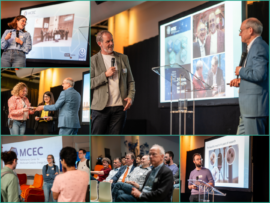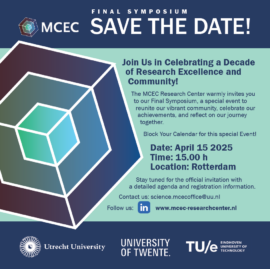Professor Alfons van Blaaderen is Full Professor at the Debye Institute for Nanomaterials Science of Utrecht University (The Netherlands).
He studied Chemistry and, after his PhD, Physics at Utrecht University and obtained his Master Degree cum laude (highest degree) in 1987. He continued at the same university with a PhD study under the supervision of Prof. Vrij, and was awarded the PhD degree cum laude (highest degree) in 1992. He was a postdoctoral fellow at Utrecht University with Prof. Lekkerkerker from 1991-1993 and at AT&T Bell Laboratories in Murray Hill (USA) with Dr. Wiltzius and Dr. Murray from 1994-1995. From 1995 he worked for 8 years at the FOM Institute AMOLF as group leader (for 50% of his time). He became associate professor in the group of Prof. Lekkerkerker at Utrecht University in 1997 and rose to the rank of full professor in the field of (Soft) Condensed Matter Physics at the same university in the Physics Department in 1999. Van Blaaderen (co-) authored ~ 165 publications in peer-reviewed journals with an average number of citations per paper of ~ 60 and a Hirsch index of 54; 33% of all his papers are journals with an impact factor > 7. Furthermore, van Blaaderen is the (co-) author of 5 popular publications and 5 book chapters and holds 5 patents/patent applications.
The research group of van Blaaderen makes seminal contributions to the field of (soft) condensed matter and in particular its subfield colloid science, fields that are multidisciplinary in nature encompassing Chemistry, Physics and Materials Science. However, the research work also spill over to neighboring fields like (micro-) biology and granular matter, where quantitative microscopy and use of particles are also often important tools.
Van Blaaderen obtained a prestigious TOP CW NWO (2005) grant from The Netherlands Science Foundation (NWO) and an Advanced ERC grant (2011) from the European Research Council and leads two FOM (Dutch Physics Science Foundation) programs. He also has received several research awards, including, the 1992 DSM Prize for Best Dutch/Belgian Chemistry PhD Thesis, the 2006 Rhodia Prize from the European Colloid and Interface Science Society and the 2011 Peter Debye Prize from the Edmond Hustinx foundation. The Soft Condensed Matter & Biophysics section he leads obtained twice in a row a ‘maximum’ score of 4x’5’ at the 5 year national Physics evaluation by an international jury. Van Blaaderen serves(d) on several boards and panels for research, including the TWINS council of the Royal Academy of Sciences (KNAW), the Dutch Nano Initiative, and COMOP council of (FOM, part of NWO). In 2007 he co-wrote for NWO a strategic report on Nanoscience. He was asked four times by the journals Science and Nature to comment in News and Views on new results in the field of colloid science. He was visiting Professor in 2006 at the Soft Matter Center (NYU, New York, USA) and 2012 distinguished visiting Professor at the Chemistry Institute of the Chinese Academy of Sciences (Beijing, China). He was scientific director of the Debye Institute for Nanomaterials Science (2008-2012) and became in 2013 elected member of the KNAW.


